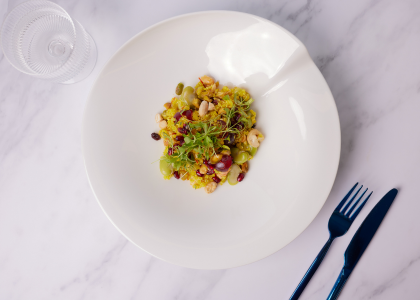
A plant-based recipe to celebrate great chefs around the world
This International Chef's Day, we're raising a fork to the hard-working and passionate chefs across the world, including Le Cordon Bleu chefs in training, ...

Perhaps one of the most overused food writing terms, ‘simple yet elegant’ has long been a common description for minimalist, humble or traditional cuisine. Stand out from the crowd and avoid writer fatigue by adding your own flair to this saying.
Perfection for one person, is not perfection for another. This is one of many reasons why the commonly overused ‘cooked to perfection’ phrase is high up on the list of food writing cliches to steer clear of. By describing the texture, visual aspects, mouthfeel or the way a utensil relates to the food is a great alternative to coining this vague term.
‘Decadent’ is a generic phrase which says very little. It could be inserted into the description of many dishes, especially ‘decadent dessert’. Whilst it may imply that the food is rich or indulgent, it does not provide your readers with real insight into the taste, sight and smell elements of what makes up the item of food.
Originating from The Muppets as the sound of the Cookie Monster eating cookies, many food writers have jumped on the ‘nom’ train to informally express their pleasure in eating. However, many readers agree that including these ‘written sounds’ in your content can be annoying, unnecessary, or even childish.
A phrase used to recommend a beverage following a meal, the imagery that comes to mind when reading ‘wash it down with…’ is not of enjoyment or savouring. In respect of the meal beforehand and the beverage of topic, it is best to avoid this when wrapping up your writing piece.
A synonym for ‘decadent’, by referring to food as ‘sinful’ you are taking away the pleasure aspect from the meal. Intended to be a word for naughty or indulgent foods, using words like ‘sinful’ has a negative or unhealthy implication to readers, as though the dish is to be withheld instead of enjoyed.
Copyright © 2026 Le Cordon Bleu International B.V. All Rights Reserved.